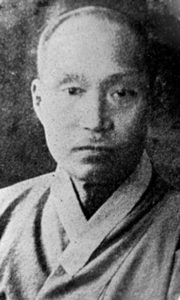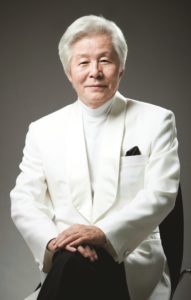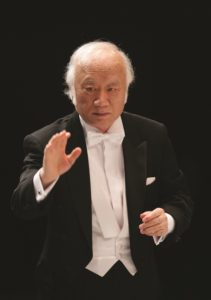Sang-Kil Lee, President of the Korean Federation for Choral Music
The Korean choral tradition arguably began in the 1880s, when Western music was introduced by Christian missionaries who came to Korea and founded educational institutions and churches. Since then Korean choral music has grown remarkably in terms of its quantity and quality and is now a significant part of Korean culture.
For several decades, choral music has been performed only by church choirs. Then it started to develop through the formation of formal choirs such as the Ewha Women’s School Choir (established in 1909) – probably the first choir in Korea. Founded in 1913 by In-Sik Kim and Nan-Pa Hong, the Kyoung Seong Choir is the first Korean private choir.

In the 1940s and ’50s, a period marked by the Independence of Korea from Japan and the Korean War, many choirs were founded in the country, such as the Kyoungsung Central Radio Choir (1941), Oratorio Choir, Sung Jong Choir, Pilgrim Choir, Korean Men’s Choir, and Agape Choir.[1] The 1960s saw the rapid development of choirs in middle and high schools and other children’s choirs, among which the Korean Children’s Choir, the World Vision Children’s Choir and the Little Angels’ Choir gained international popularity.
In the early 1970s, Korea began to broaden its awareness of traditional heritage and culture by means of campaigns, education, and mass media, and the organized governmental movement ‘Sae-Ma-Ul Un-Dong’ (Building a New Country Movement) brought out significant national and patriotic cultural development all over the country.[2] At that time, the government held choral music competitions for amateur choirs in order to encourage people to sing and to promote the spirit of the community. Along with these initiatives, the National Chorus of Korea (NCK), the first professional choir in Korea, was founded when the National Theatre was opened in 1973. Following the founding of the NCK, many civic or professional choirs were formed in major cities. The DaeWoo Choir was founded in 1983 and was the first professional choir sponsored by a private company.
During the 1980s, Korean choral music was significantly influenced by the hosting of big international events such as the Asian Games in 1986 and the Olympics in 1988. These international events allowed the Koreans to experience diverse cultures and traditions from other countries, which further supported the importance of cultivating a culture of national identity.[3] As a result, choral music in Korea made a new leap forward to international level in its performance and repertoire.
The past thirty years represent the so-called choral boom period in Korea. Many large Korean churches, primarily from Presbyterian, Methodist, Baptist, Pentecostal and Catholic backgrounds, have extremely large choral programs and even orchestras. Beyond the regular worship services, these churches also hold concerts of classical and contemporary choral music or sponsored church music conferences for not only professional musicians but also for all choral music lovers.[4]
Numerous amateur choirs in Korea, including community, youth, and school choirs (elementary school to university) have obtained financial support from public organizations through regular and annual programs that have contributed to the development of diverse styles of choral repertoire and increased the public’s interest in choral music. As a result, there are now over sixty civic professional choirs in major cities, which play significant roles in maintaining and improving the musical culture of Korea.[5]
The author believes that contemporary Korean choral music can be defined with the term ‘glocalism’ as it follows the global trend, but with added local contents. Through participating in various international choral events and conferences, the repertoire of local choral compositions becomes wider and richer, with the increasing desire to express vernacular sentiment and different interpretations. Thus, the golden age of choral music has now reached a crucial point of globalism.
The Organization of Korean Choral Music
The reason for the remarkable development of Korean choral music in spite of its short history is that some senior conductors and leaders have successfully pioneered the spirit of choral music. In this great development, two great contributors to Korean choral music may be mentioned: Young-Soo Nah and Hak-Won Yoon.
Conductor Young-soo Nah has dedicated himself to the Korean choral culture as the first conductor of the National Chorus of Korea (NCK). All NCK’s performances and activities directed by Mr. Nah encouraged composers to create numerous choral works, thus contributing to the development of native choral repertories. Moreover, this choral movement initiated by the NCK ultimately inspired the formation of professional choirs and strongly motivated the creation of several amateur choirs throughout the country.

These positive developments were actively continued by a leading conductor and composer, Hak-Won Yoon, with the Incheon City Choir since 1996. Dr. Yoon and his choirs – the Incheon City Choir, Seoul Ladies Singers, Daewoo Choir, World Vision Children’s Choir – contributed to introduce contemporary Korean choral music all over the world through outstanding performances on the stages of various international conferences and competitions such as ‘Marktoberdorf International Choral Competition’ (Germany), ‘Tolosa Choir Competition’ (Spain), ‘IFCM Symposium’ (1999), and ‘ACDA National Convention’ (2009).

Two main choral organizations – the Korean Federation for Choral Music (KFCM) and the Korean Choral Directors Association (KCDA) – have also played leading roles in choral music in Korea.
Korean Federation for Choral Music (KFCM)
The Korean Federation for Choral Music (KFCM) was founded in 1973 and is a non-profit organization dedicated to the development and promotion of choral music in Korea. It provides exchange opportunities between choristers to boost communication and knowledge. The KFCM has hosted various events, activities, seminars, master classes, and performances for choral musicians.
The KFCM is organized through regional and functional divisions. There are fifteen regional divisions, and the functional divisions include nine groups – elementary, middle and high schools, children’s, college, adults, a cappella, national and civic choirs and composers. The KFCM encourages its divisions to carry out their own activities such as seminars and performances.
The KFCM holds two major events annually. The ‘Korean Choral Festival’ introduces various performances from each functional division. It encourages the participating choirs to show their musical excellence and offers them an opportunity to meet and learn. The other key event of the KFCM is the ‘Korean Choral Symposium.’ This is the oldest, largest, and most authoritative choral symposium in Korea, arranging performances, presenting lectures and organizing seminars.
The current President of the KFCM, Sang-Kil Lee, has been conducting civic choirs since 1984, including the Suwon, Taegu, and recently Anyang civic choirs. In particular, he has conducted the Suwon Civic Chorale for 18 years, and brought his choir to the highest level – thanks to his wonderful musicianship and leadership. As a result of the great reputation gained under his direction, the choir was invited to the ‘4th IFCM symposium in Sydney’, Australia, in 1997 and to the Oregon Bach Festival, in collaboration with Helmuth Rilling. Since the appointment of Mr. Lee as the music director of the Anyang Civic Chorale in 2006, the sound of the choir has noticeably improved, and the choir was invited to the ‘8th IFCM symposium in Copenhagen’, Denmark in 2008.
Korean Choral Directors Association (KCDA)
The Korean Choral Directors Association (KCDA) was founded in 1999 and is a congregate of choral conductors, leaders in professional choral music in Korea. The splendid festival called the Korea Chorus Festival is held annually. During this festival, famous municipal choirs and exceptional university choirs greatly impress choral music lovers with their colorful, broad and diversified choral repertoire.
The KCDA actively contributes to the development of choral music in Korea, by scouting and training rising conductors, exploring and introducing choral music performances of Korean composers, facilitating international exchange of information for conductors, and holding choral seminars and the ‘Korean Choral Festival’ amongst others.
Chun Koo has been president of the KCDA since 2009. He has often been referred to as ‘the conductor capturing the audience with excellent ability of musical interpretation’ and has also been appointed as the Music Director & Conductor of Ulsan Metropolitan City. Having led major city choirs over 10 years as music director, Chun Koo has expressed his wide artistic field through various repertoires from classical music to modern music, and has revealed the essence of choral music with his refined techniques in rhythm and excellent interpretation skills.
10th World Symposium on Choral Music in Seoul, Korea in 2014
The KFCM and the Korean choral musicians are now eager to host the ‘10th World Symposium on Choral Music’, to be held from 6th to 13th August 2014 in Seoul, Korea, in cooperation with IFCM. It is a privilege to hold such a prominent choral event in Korea and we look forward to welcoming wonderful choral groups and choral music lovers from all over the world. We do hope this extraordinary event will attract as many participants as possible.
The appointment of the Republic of Korea as the host country for the 2014 World Symposium on Choral Music is the result of the efforts of Ambassador Dho Young-shim, IFCM Board member and Chairperson of the UNWTO ST-EP Foundation with headquarters in Seoul, which aims to eliminate poverty through sustainable tourism projects.
Considering that choral music can be a powerful tool for education and development, the ST-EP Foundation has supported IFCM initiatives such as ‘African Children Sing!’ and ‘Conductors Without Borders’, addressed to poor communities in developing countries, particularly in Africa.
[1] Yuseon Lee, The History of Korean Music for Past 100 Years, Seoul: Music Choonchoo, 1985, 211-2.
[2] Mi-Young Choi, The History of Music Curriculum in South Korean Middle Schools, diss., University of Minnesota, 2006, 43-44.
[3] Kim, Eun-Sil, A Study of Arirang and its Influence on Contemporary Korean Choral Works, diss., University of Southern California, 2008, 14.
[4] Kim, Yeon-Sul, A Study of the Development of Korean Choral Music after the 1960s, Taejeon: Choongnam National University Press, 2003, 10-11.
[5] Hyun-Chung Ji, A Performance Practice Guide to Missa Arirang by Cool Jae Huh, diss., University of Minnesota, February 2012, 27-31.
E-mail: sangkilc@gmail.com
English translation and editing by Hyunjin Cho, Hyun-chung Ji, Catherine Germier-Hamel
Edited by Sue-Ann Struwe, South Africa

